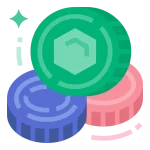Tokens in C++
About Tokens in C++:
Tokens in C++ are the smallest individual elements of a program that the compiler can recognize. They serve as the fundamental units of a C++ program and include identifiers, keywords, constants, literals, operators, and punctuators.

Different Tokens in C++ :
1. Identifiers and Keywords
Identifiers in C++ are names given by programmers to various program elements. They can include variables, functions, classes, objects, and user-defined data types. Identifiers must follow specific rules:
- They can consist of letters (both uppercase and lowercase), digits, and underscores.
- The first character must be a letter or an underscore.
- C++ is case-sensitive, so “myVar” and “MyVar” are different identifiers.
2. Constants and Literals
Constants in C++ are fixed values that remain unchanged throughout the program’s execution. They can be of various types, such as integer constants, floating-point constants, character constants, and boolean constants. Numeric literals represent numerical values in C++ and can be of different bases:
- Decimal: e.g., 10, 3.14
- Octal: e.g., 077 (representing 63 in decimal)
- Hexadecimal: e.g., 0x1F (representing 31 in decimal)
3. Operators and Punctuators
Operators in C++ are symbols that perform specific operations on data. They can be arithmetic, relational, logical, bitwise, or assignment operators. Examples include ‘+’, ‘-‘, ‘*’, ‘/’, ‘==’, ‘&&’, ‘|’, and ‘=’. Punctuators, on the other hand, are symbols used for syntax and organization of code in C++. They include braces ‘{‘, ‘}’, parentheses ‘(‘, ‘)’, commas ‘,’, semicolons ‘;’, and more.
Tokenization in C++ :
Tokenization is the process of breaking a C++ program into its individual tokens. The compiler uses tokenization to analyze and interpret the code. Each token serves as a meaningful unit that contributes to the program’s overall structure and functionality.
Tokenization is a crucial step in the compilation process. It allows the compiler to understand the program’s syntax, identify potential errors, and generate the corresponding machine code for execution.
Example of Token in C++:
Let’s write the code for the better understanding of Tokens :
#include<iostream>
int main() {
int num1 = 10;
int num2 = 5;
int sum = num1 + num2;
std::cout << "The sum is: " << sum << std::endl;
return 0;
}
After tokenization, the code snippet can be broken down into the following tokens:
- Keywords:
#include,int,main,return. - Identifiers:
num1,num2,sum. - Constants:
10,5,0. - Literals:
"The sum is: ",std::endl. - Operators:
=,+,<<. - Punctuators:
<,>,(,),{,},;.
Conclusion
Tokens are the essential building blocks of C++ code, encompassing various elements like identifiers, keywords, constants, literals, operators, and punctuators. Understanding the role and usage of tokens is crucial for writing efficient and error-free C++ programs. By mastering tokenization and adhering to best practices, developers can create robust and reliable C++ applications.
Prime Course Trailer
Related Banners
Get PrepInsta Prime & get Access to all 200+ courses offered by PrepInsta in One Subscription
Get over 200+ course One Subscription
Courses like AI/ML, Cloud Computing, Ethical Hacking, C, C++, Java, Python, DSA (All Languages), Competitive Coding (All Languages), TCS, Infosys, Wipro, Amazon, DBMS, SQL and others





